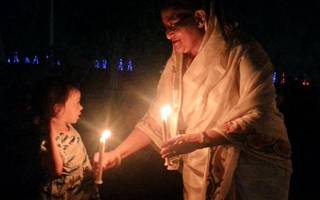Shops and business establishments will remain open and public transport will operate normally during a nationwide strike called by the Jamaat-e-Islami on Monday, associations said.
Defying Jamaat's strike
Dhaka Metropolitan Shop Owners Association and its parent Bangladesh
Shop Owners Association decided to keep all shops open during the strike
after a meeting held at Alpana Plaza on Dhaka's Elephant Road.
“We will defy the illogical shutdown… All shops will remain open tomorrow throughout Bangladesh,” said the Association’s General Secretary SA Kader Kiron.
“We will defy the illogical shutdown… All shops will remain open tomorrow throughout Bangladesh,” said the Association’s General Secretary SA Kader Kiron.
“All other shop associations have been informed,” he said.
Calls were made from Shahbagh to defy the Jamaat sponsored shutdown for Monday. The protestors there appeared charged up over the death of blogger Rajib Haider, who has been at the forefront of the Shahbagh protests from its inception.
Kiron ruled out security fears for the shops and business establishments who may be attacked for defying the strike call.
“We are good enough to resist the Jamaat-Shibir combine . Instead we will tell our customers… come to the markets, the authorities will take care of your security.”
Bangladesh Road Transport Association General Secretary Khandaker Enayetullah said they had also decided to operate normally all forms of public transport throughout Bangladesh.
Shop owners association had expressed anger in the killing of blogger and architect Rajib Haider. They demanded quick arrest of the killers while expressing solidarity with the Shahbagh protests.
They also urged to rename Shahbagh ‘Rajib Chattar’.Bdnews24
Calls were made from Shahbagh to defy the Jamaat sponsored shutdown for Monday. The protestors there appeared charged up over the death of blogger Rajib Haider, who has been at the forefront of the Shahbagh protests from its inception.
Kiron ruled out security fears for the shops and business establishments who may be attacked for defying the strike call.
“We are good enough to resist the Jamaat-Shibir combine . Instead we will tell our customers… come to the markets, the authorities will take care of your security.”
Bangladesh Road Transport Association General Secretary Khandaker Enayetullah said they had also decided to operate normally all forms of public transport throughout Bangladesh.
Shop owners association had expressed anger in the killing of blogger and architect Rajib Haider. They demanded quick arrest of the killers while expressing solidarity with the Shahbagh protests.
They also urged to rename Shahbagh ‘Rajib Chattar’.Bdnews24















